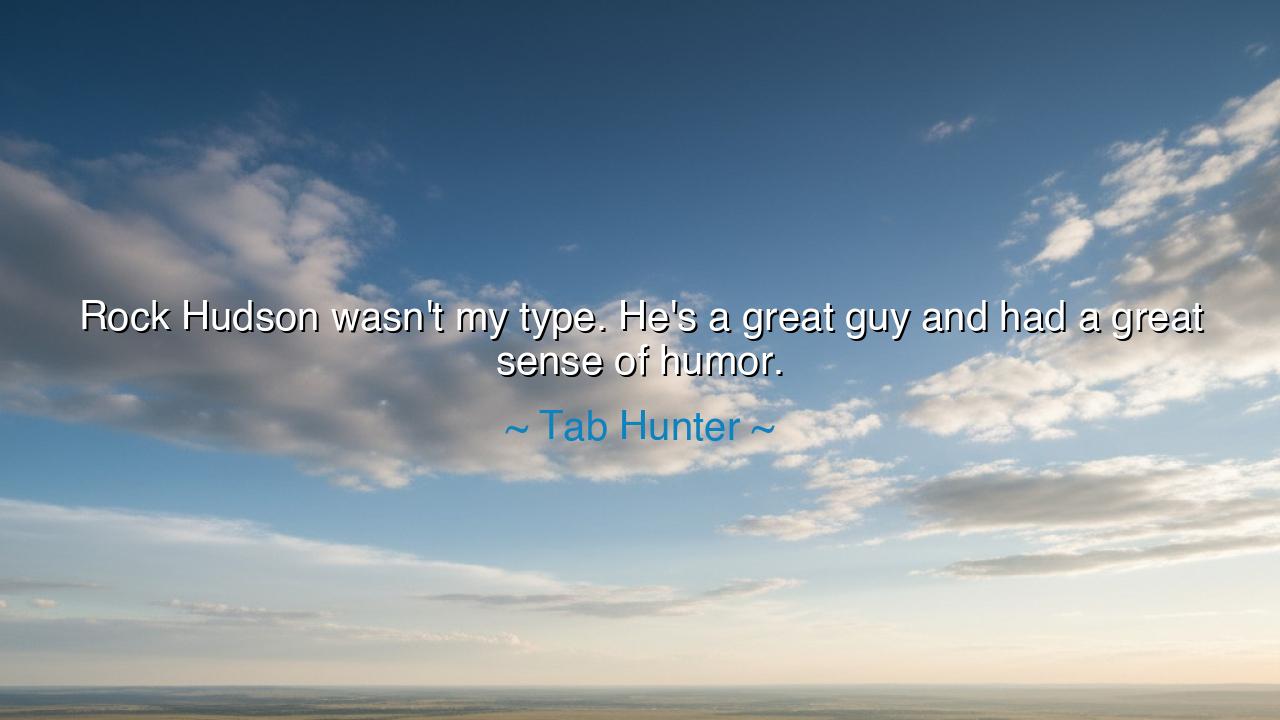
Rock Hudson wasn't my type. He's a great guy and had a great






When Tab Hunter said, “Rock Hudson wasn’t my type. He’s a great guy and had a great sense of humor,” he was not merely speaking of attraction or preference — he was unveiling something far more profound about the nature of connection, respect, and the sacred humanity within every soul. His words, light on the surface, carry the quiet dignity of one who lived between truth and silence, between public image and private heart. Beneath the charm of his statement lies a timeless truth: that admiration need not be possession, and love can exist in forms untouched by desire.
In the age of the ancients, philosophers spoke of philia, the love of respect and friendship, which stands apart from eros, the love of passion. What Hunter expressed is the wisdom of that ancient distinction. Rock Hudson, a symbol of golden-age charisma and secrecy, and Tab Hunter, himself a man caught between fame and authenticity, shared more than the public knew — the struggle of identity beneath the gaze of a world not yet ready to understand. When Hunter calls Hudson “a great guy” and honors his sense of humor, he lifts the veil on a brotherhood built not on romance, but on shared humanity and grace.
Humor, in Hunter’s words, becomes the bridge that joins hearts without demand. It is the gentlest kind of love — one that heals, one that allows two souls to meet as equals. In laughter, all pretense falls away. The mask of fame, the armor of masculinity, the chains of expectation — all dissolve in the warmth of genuine connection. To say someone “had a great sense of humor” is, in truth, to say they possessed light in their soul — a light capable of softening pain, of making life bearable when the world feels cruel. It is this laughter that binds us all, that redeems us from the loneliness of our hidden battles.
Consider the story of Oscar Wilde, the great wit of his time, who too lived beneath the shadow of judgment. Even as the world condemned him, he never lost his humor. When imprisoned, he told a friend, “I never travel without my diary. One should always have something sensational to read on the train.” His laughter, even in suffering, became his shield — the same kind of laughter Hudson and Hunter shared in their world of whispered truths and glittering façades. Humor, for such men, was not just comedy — it was survival.
Thus, Hunter’s words are not simply nostalgia for a friend; they are the remembrance of a kindred soul. In acknowledging Hudson’s great sense of humor, he honors the courage of those who found light amid constraint, who smiled through silence. It is a testament to the quiet nobility of those who carried both pain and grace with equal measure. Behind the glitz of Hollywood was the ancient human struggle — to be seen, to be loved, and to remain kind despite misunderstanding.
We must learn from their example. Too often, we confine love to narrow forms, forgetting that affection wears many faces — friendship, laughter, admiration, compassion. True connection is not always romantic; it is often the simple recognition of goodness in another. When we, like Hunter, can look upon someone and say, “You are not my type, but I honor your light,” we have reached a higher wisdom — the love that expects nothing and respects everything.
The lesson, then, is both tender and enduring: seek to find beauty in others without claiming them; honor the humor, kindness, and humanity in every soul you meet. For the world is made gentler not by desire, but by understanding. And if, like Tab Hunter, you can speak of others with warmth, respect, and laughter — even when the past is long gone — then you, too, have learned the art of love in its purest, most ancient form: love without possession, affection without pretense, and humor as the light that makes us human.






AAdministratorAdministrator
Welcome, honored guests. Please leave a comment, we will respond soon